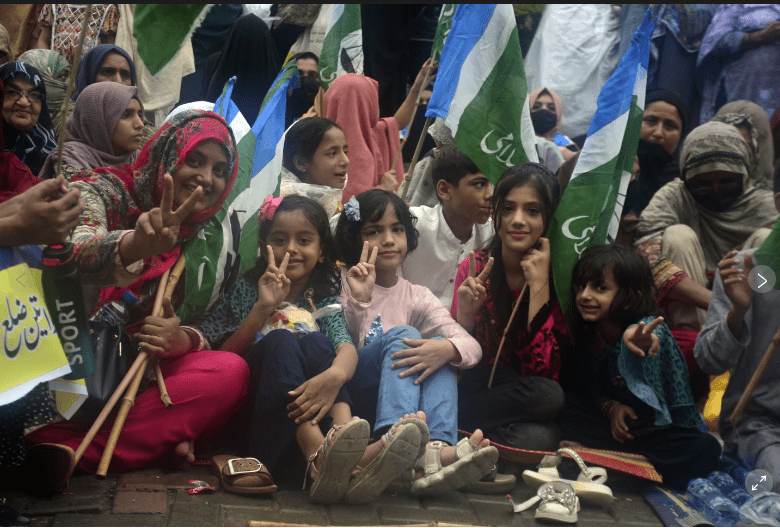Skyrocketing electricity costs prompt demonstrations in Pakistan’s capital.

ISLAMABAD (AP) — Protests over skyrocketing power bills shut down a major road into Pakistan’s capital on Monday as some 3,000 supporters of a major Islamist party continued a sit-in despite pouring monsoon rains.
In Pakistan’s southwest, meanwhile, thousands protested against police violence, an internet shutdown and highway closures. At least one person was reportedly killed.
Protesters demanding that the government withdraw taxes on electricity to offset price hikes have occupied a road in the garrison city of Rawalpindi since Friday, as police prevented them from heading to the capital Islamabad.
Hoisting the white, blue, and green flags of the Islamist Jamaat-e-Islami party, the protesters chanted: “This cruel increase in electricity bills is not acceptable.”
The government has met with protest leaders, but given no indication that it is considering accepting their demands.
Naeem-ur-Rehman, who heads the Jamaat-e-Islami party that called for the protests, says it’s prepared to remain on the streets for as long as it takes.
The government raised power prices 26% during the last fiscal year, which ended June 30, before tacking on another 20% increase on July 13. Officials say the increases were needed to meet conditions set by the International Monetary Fund for a $7 billion loan deal made earlier this month.
The government has also added a confusing bevy of taxes on top of the base price, adding up to a bill that has more than doubled for some Pakistanis.
“This month I paid 22,000 rupees ($80) for my electricity bill, while in May I only paid 10,000 rupees ($36),” said Asma Humayon, who teaches at a private school in the city of Lahore. “I don’t know how to run the kitchen; now half of my salary is going to energy bill.”
Hundreds of supporters of the Islamist Jamaat-e-Islami party, mainly women, also rallied against rising bills in Lahore.
Pakistani economist Ashfaque Hasan said another factor in costly power is a deal the government made in the 1990s to buy power from private companies at high prices.
“Pakistan and these independent power producing companies cannot co-exist,” Hasan said.
Hundreds of thousands of Pakistanis have started using solar panels in recent years to avoid heavy electricity bills and power outages, although not everyone can afford the systems.
In Baluchistan province in Pakistan’s southwest, meanwhile, thousands protested against police violence, an internet shutdown and highway closures, community leaders said Monday.
People had been heading across Baluchistan province a day earlier to take part in a mass gathering when security forces reportedly opened fire to disperse the crowds, according to a statement from the event organizers.
At least one person was killed and seven were injured, they said, while Amnesty International put the death toll at three.
However, the military said its own forces had been attacked by a violent mob in the district of Gwadar and that one soldier was killed and 16 wounded. In a statement, it said propaganda was being spread against the military on social media. It said the troops exercised extreme restraint to avoid civilian casualties but those behind the violence would be brought to justice.
It’s the latest unrest to strike the country’s largest and poorest province. Armed groups have waged an insurgency against the state for decades, demanding independence.
There are also deep grievances about enforced disappearances, extrajudicial killings and the exploitation of Baluchistan’s abundant natural resources at the expense of people in the province.
The mass gathering was intended to air these grievances.
Following Sunday’s violence, a statement from the human rights advocacy group Baloch Yakjehti Committee warned Islamabad that the situation would escape the state’s control if authorities continued to use force on peaceful public gatherings.
“You people have created an apocalypse in Baluchistan for the last two days, injured many people, martyred a youth and forcibly disappeared hundreds,” the committee said.
A spokesperson for the Baluchistan government, Shahid Rind, said the provincial minister was heading to the city of Gwadar to try to contact the committee’s leaders.






